Government services provided electronically. Recommendations were developed by the G2B project working group based on the results of an analysis of the best European and Russian practices, as well as based on an analysis of existing gaps. Difficulty in selecting a dock
Information resources serve as the basis for creating information products and providing information services. Electronic services are a type of information services. The term “electronic resources” means the formation information resources in a form convenient not only for storage and processing, but also, first of all, for visualization and presentation using information technologies. Electronic form means the ability to visualize a product or service using automated or computer tools visualization. These tools include not only a computer, but also other devices, for example, terminals, ticket machines, etc.
Electronic resources serve as the basis for obtaining electronic services and determine their quality and life cycle. In turn, the life cycle of electronic resources is determined by the duration of existence of the legislative and regulatory framework. Changing the regulatory framework leads to the updating of electronic resources and allows for their modernization, that is, it extends their life cycle. In this case, modernization and adaptation of electronic services takes place. Replacing the regulatory framework entails the end of the life cycle of electronic resources. In this case, the life cycle of electronic services ends and the creation of new electronic services or significant modernization of existing ones is required.
A feature of the implementation of modern information and electronic services is the use and accounting of information spaces. The concept of information support integration leads to the need to create a single information space on a national, industry and enterprise scale.
The process of electronicization of information resources requires software, which can be divided into two groups: for creating and for using electronic resources. In relation to electronic services, this software is divided into: software for creating electronic services and software for providing electronic services. Such software is created and operated either separately or jointly. Software is created separately when the group of creators of information services is independent of the group of consumers.
If information services operate in a single environment of consumers who form and modify them, then the software integrates both groups. In this case, one part of the software configures or structures the system, and the second implements real processing information, implementation of production processes, receipt of electronic documents and provision of electronic services.
The creation of electronic resources is based on the concept of static and dynamic electronic documents, in which each type of document containing information about specific facts is presented as a set of information models with its own characteristics and attributes. Modern technology storing electronic resources requires promptly managing and updating information stored in information repositories.
An electronic document (ED) is an information object, or a certain collection, which is formed by any type of structured data that contains a complete information message, can be authorized, stored in digital form and reproduced in a form perceivable by a person. Thus, ED can be considered as an information product. Electronic documents have three main groups of characteristics for which various technological means are responsible: storage, presentation, intelligence.
Every document, like an information model, has a presentation form. Also associated with it is the concept of document style - a form that appears when a document is reproduced, that is, when it is processed by a word processor.
The form of an electronic document is specified as a format description, including:
the geometry of the location of the text of the electronic document on the sheet (layout);
the use of certain fonts for certain purposes;
a way to represent different types of data.
If the document includes Various types data (text, tables, graphics, video, etc.), they talk about a compound document.
Dynamic information model An electronic document is a virtual document. A virtual document is a collection of information objects constructed either from a collection of temporary files or as a result of user interaction with information system. A new form of electronic documents that have no analogues among paper ones are interactive documents. They use the properties of modernization, multi-level and multi-form presentation of electronic documents.
The property of electronic documents is the possibility of their continuous modernization. This property significantly increases the life cycle of an electronic document and makes it much more durable than paper.
Another property of an electronic document is its presentation not in the form of a linear structure like a paper document, but in the form of a hierarchical tree, with the ability to display one or another part of the tree.
Electronic service, or electronic information service, is a service to meet the information needs of the user, having a computer or electronic form of presentation. Thus, an electronic service is associated with the provision of an electronic document and, as an option, its translation into regular paper form. The objectives of electronic services are to increase the reliability and improve the performance of public service systems; security necessary information and services to the general public.
It is necessary to distinguish between information services and information electronic services or services in electronic form.
Information services may relate to the non-computer field, for example legal advice or design work. Services in electronic form always use computer technology, computer models, electronic document management and visual electronic form of presentation.
Electronic government services can be defined as a special type of information services related to meeting the information needs of the general public by issuing electronic documents or electronic reference information that reflects the content of legislative acts and regulations. For electronic public services The concept of regulation is characteristic.
Thus, electronic services are formed on the basis of electronic resources. Their life cycle is associated with the duration of the existence of the legislative and regulatory framework. Software and technology can form integrated or separate complexes.
BIBLIOGRAPHY:
1. Polyakov A.A., Tsvetkov V.Ya. Information technologies in management. - M.: Moscow State University Faculty of Public Administration, 2007 - 138 p.
2. Polyakov A.A., Tsvetkov V.Ya. Applied informatics: In 2 parts: / Under the general editorship. A.N. Tikhonov. Part.1 - M.: MAX Press. 2008 -788 p.
Bibliographic link
Tsvetkov V.Ya., Semushkina S.G. ELECTRONIC RESOURCES AND ELECTRONIC SERVICES // Modern problems of science and education. – 2009. – No. 6-1.;URL: https://science-education.ru/ru/article/view?id=1303 (date of access: November 25, 2017). We bring to your attention magazines published by the publishing house "Academy of Natural Sciences"
The TACIS project “Development of interactive government services based on the Internet for business in the North-West in Russia” started in November 2005 and lasted 24 months.
The project was implemented in coordination with state target programs of the Russian Federation (including the “Electronic Russia” program), as a continuation of the EU strategy towards the Russian Federation and, in particular, according to the Action Plan “Northern Direction” and TACIS 2003 - Action Program for Cooperation in the Baltic Sea Region .
The above-mentioned project was registered with the Commission for International Technical Assistance of the Ministry of Economic Development and Trade of the Russian Federation as part of the Tacis Program for the Baltic Region for 2003. The corresponding project registration number is EU-021000
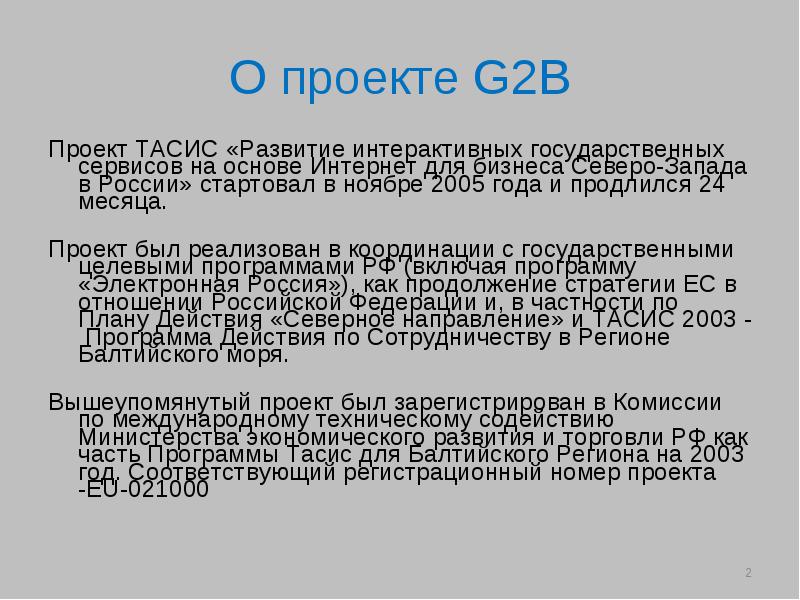
State electronic service– one of the types of regulations for the implementation of public administration functions, implemented through telecommunication technologies, which:
carried out by executive authorities of all levels in accordance with current legislation;
financed from the state budget;
satisfies the specific information needs of society as a whole and individual individuals or legal entities:
- Certifying;
- Justifying;
- Prescriptive;
- Proving
State interactive electronic service – In addition, it involves self-identification of the recipient of the service, the formation of a user-oriented format and regulations for receiving the service, and assessment of the effectiveness of the provision of the service.
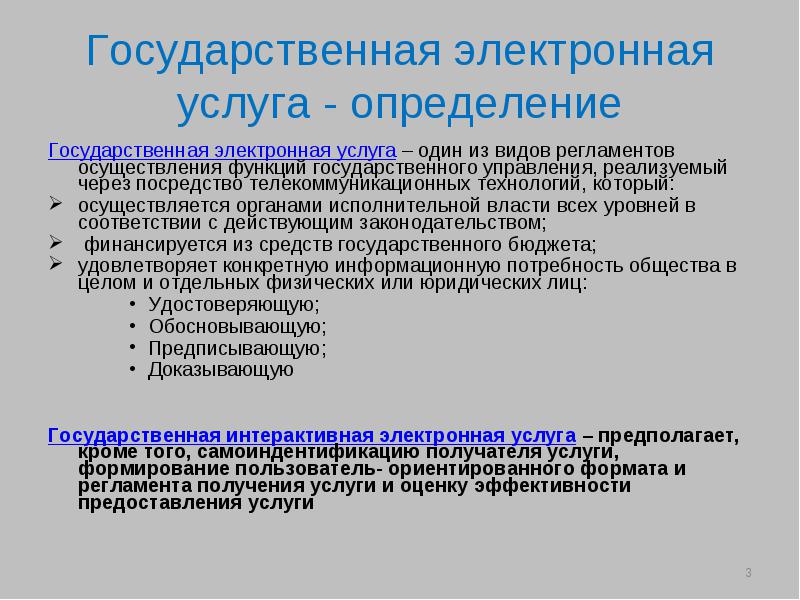
The concept of “state electronic service” implies that for each type of service or specific service the following is defined:
The target population group for which the government electronic service is provided.
Regulations for the provision of state electronic services.
The regulatory framework governing the provision of government electronic services.
The executive authority responsible for the provision of state electronic services.
Sources of financing for the provision of state electronic services
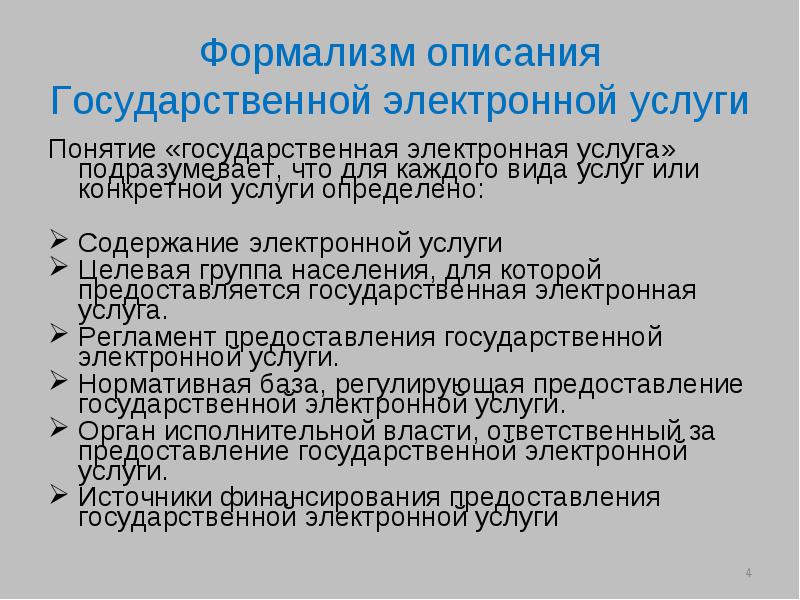
The components of ensuring the achievement of the set management goals in the field of creating and ensuring the functioning of an integrated system of government electronic services can be described in the following aspects (or by types of components of management activities):
Regulatory component (regulatory and instructional materials regulating activities in the field of government electronic services)
Organizational and administrative component (infrastructure and resource provision in the field of public government electronic services)
Information technology component (methodology and technology for collecting and analyzing information on all aspects in the field of government electronic services for making management decisions
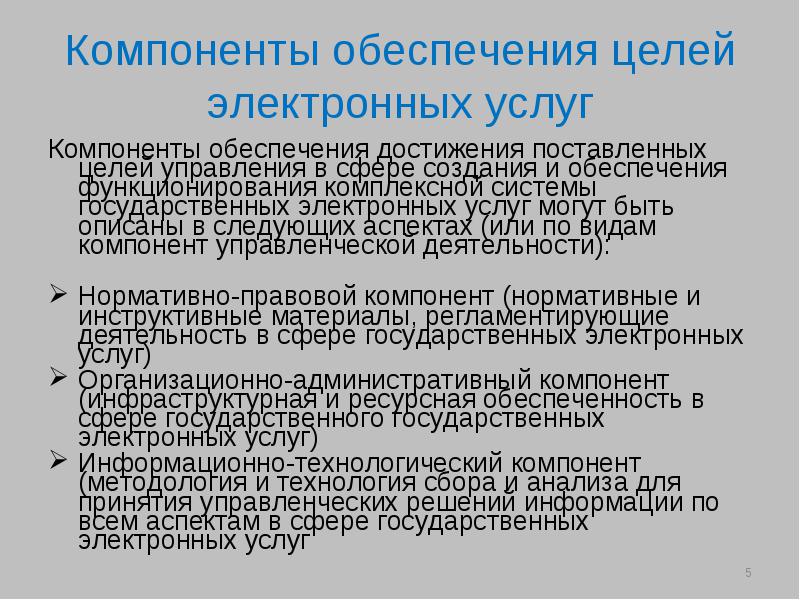
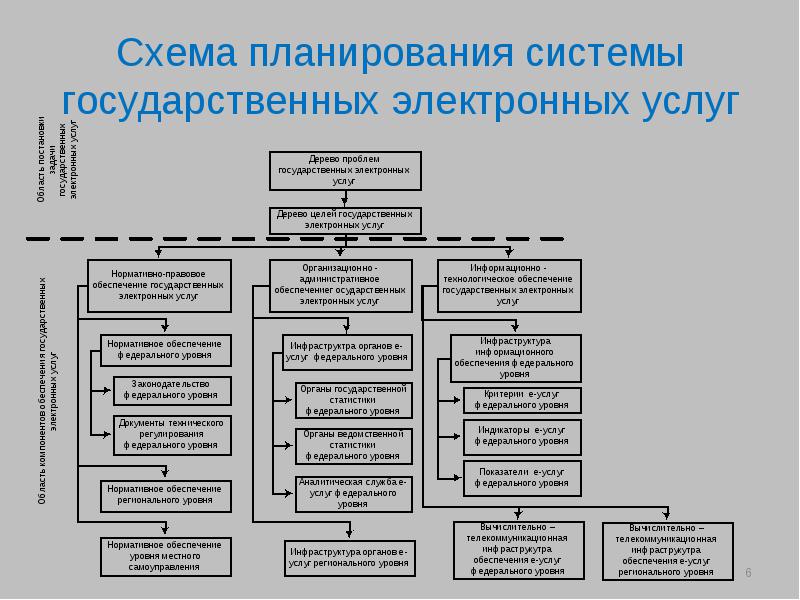
Recommendations were developed by the G2B project working group based on the results of an analysis of the best European and Russian practices, as well as based on an analysis of existing gaps.
general content (which was formulated identically for all pilot regions)
clarifications to the implementation of general recommendations (which took into account the specifics of the implementation of each specific recommendation in specific groups of regions)
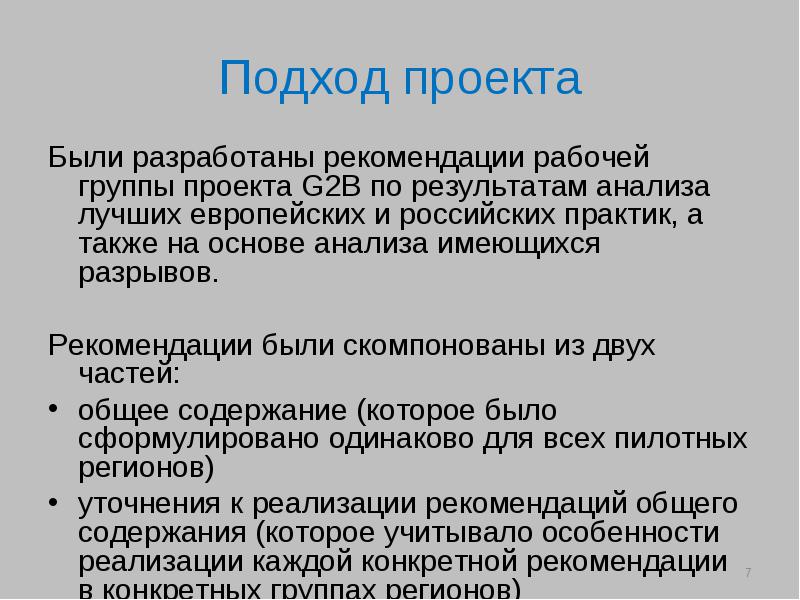
Requirements for high-quality power plants are conveyed by the acronym SMART, developed within the framework of the Performance Management and Development System.
SMART principles include:
Specific - OGV must establish precise standards for all power plants to ensure compliance with the expectations and needs of target groups.
Measurable - what is measurable is controllable. The established requirements of representatives of target groups must be presented in a form that allows for measurement and collection of information for its implementation.
Achievable - it is important that the established GEM can be achieved based on the resources that are available to the OGV. These goals must be realistic, both in terms of meeting the expectations of representatives of target groups and in terms of allocating limited resources.
Relevant - OGV should undertake to fulfill the GEM of those service characteristics that are important to representatives of target groups.
Timebound - power plants must be installed in such a way as to allow the possibility of analyzing their performance after a certain time. At a minimum, all power plants should be assessed in terms of their performance in the OGV reports.
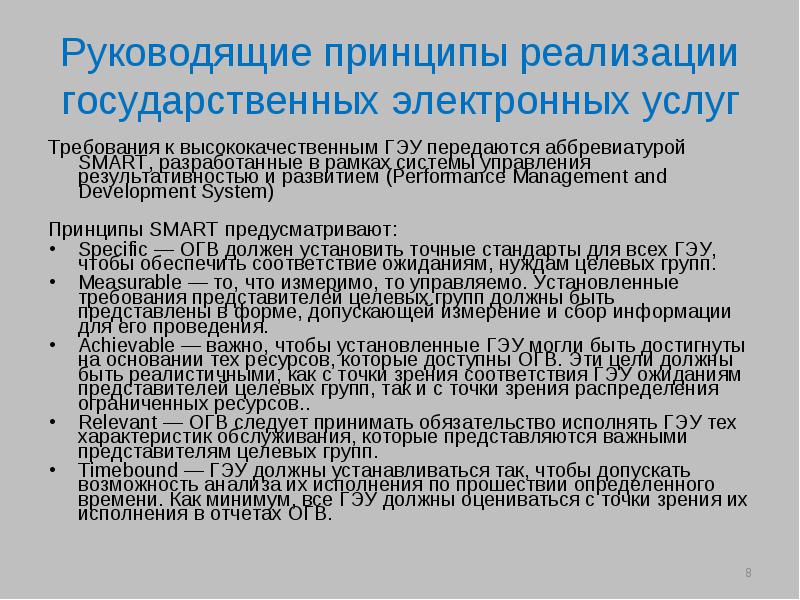
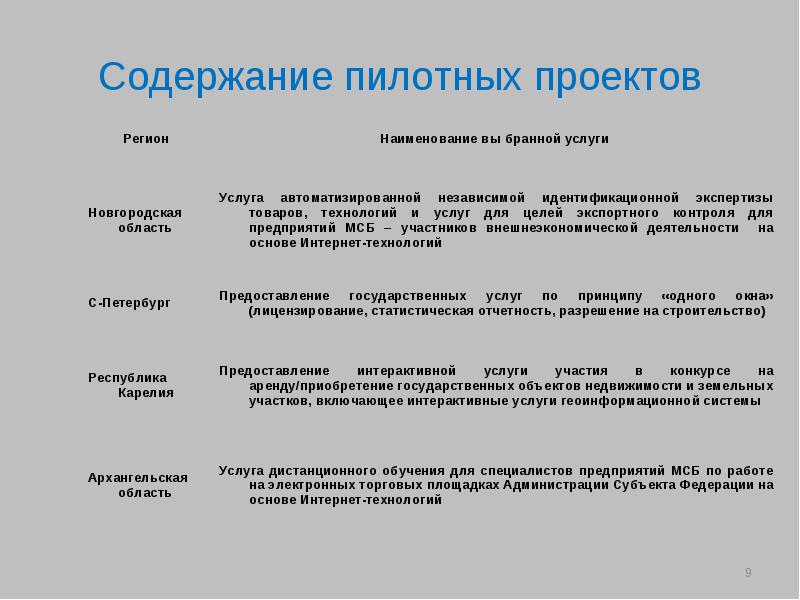

The distance learning service for specialists of small and medium-sized businesses on working on electronic trading platforms is:
A state information resource of modular educational materials posted on the Internet portal, containing:
- Educational materials on federal legislation regulating government procurement;
- Educational materials on the legislation of the Arkhangelsk region regulating public procurement;
- Educational materials on government procurement procedures;
- Educational materials on the requirements for preparing competitive applications for participation in state orders of the Arkhangelsk region.
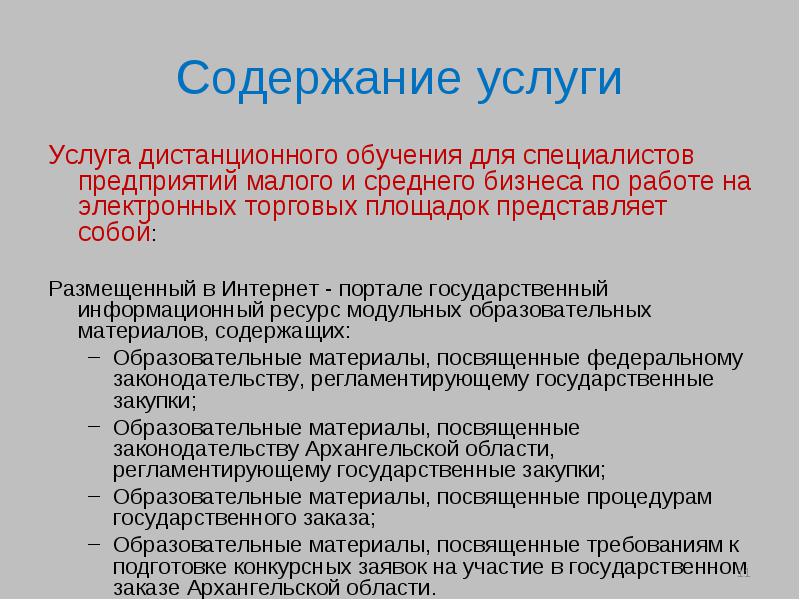
Target group – SMEs, residents of the Arkhangelsk region, numbering up to 150 people, who are suppliers of goods and services for government needs. (The total number of enterprises is 4,750, employing more than 34.5 thousand people).
The target group is assumed to be a user of the electronic trading platform, the portal of the Administration of the Arkhangelsk Region. The first stage of the electronic trading platform (ETP) was created in 2004, it is constantly being improved, the completion date for the creation is December 2006. The costs of creating and improving the ETP are financed from the regional budget. The amount of financing is about 1.5 million rubles. in year
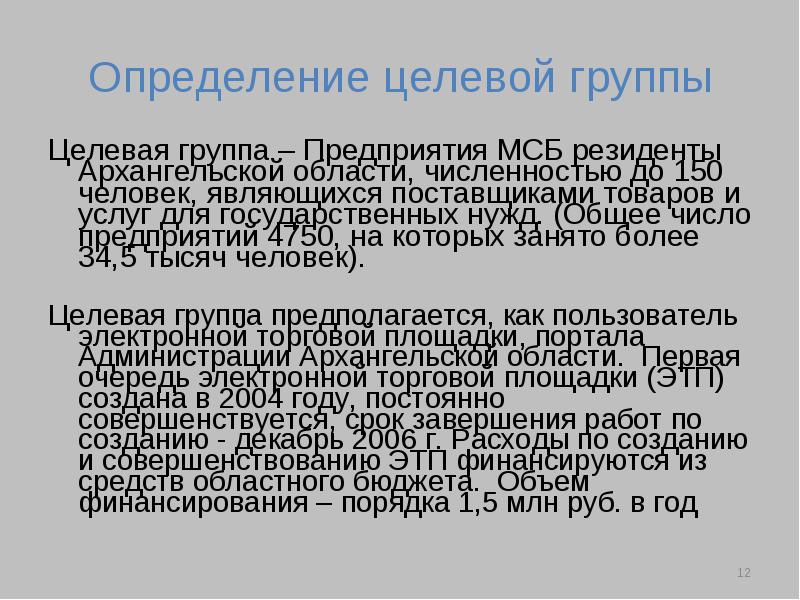
For the target group of recipients of the proposed service, the following problems have currently been identified that make it difficult or impossible for enterprises to participate in the public order system of the Administration of the Arkhangelsk Region:
Lack of experience of enterprises in working with government tender procedures.
Difficulty in selecting documents to submit for tender.
Administrative barriers to obtaining identification or permitting documents.
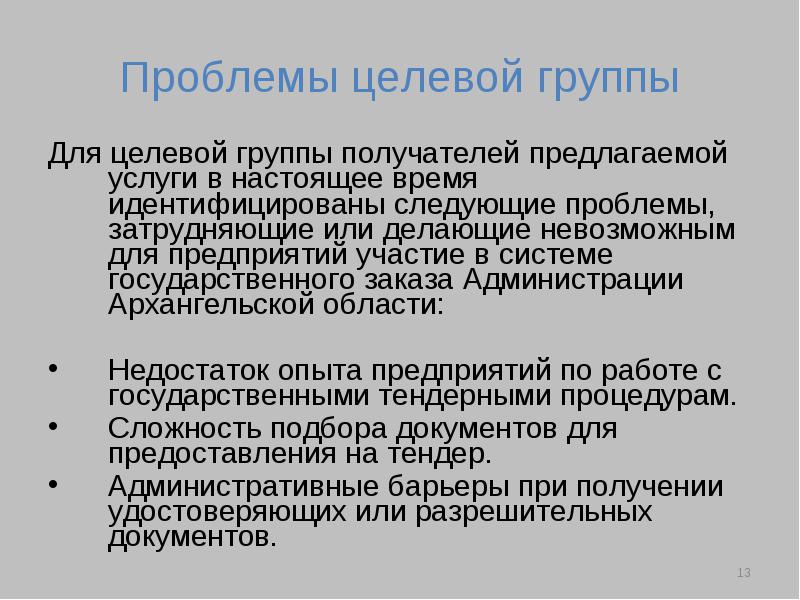
The need for results is justified by the existing fairly high percentage of the number of competitive applications (up to 15%), executed in violation of documentation forms and incomplete provision of materials, which is due to insufficient awareness of entrepreneurs about the requirements and composition of the competition documentation.
SMEs, as well as government agencies in the Arkhangelsk region, are interested in reducing this indicator.
Reducing the time spent on completing a competitive application is also a significant motivating factor in the creation and implementation of the service.
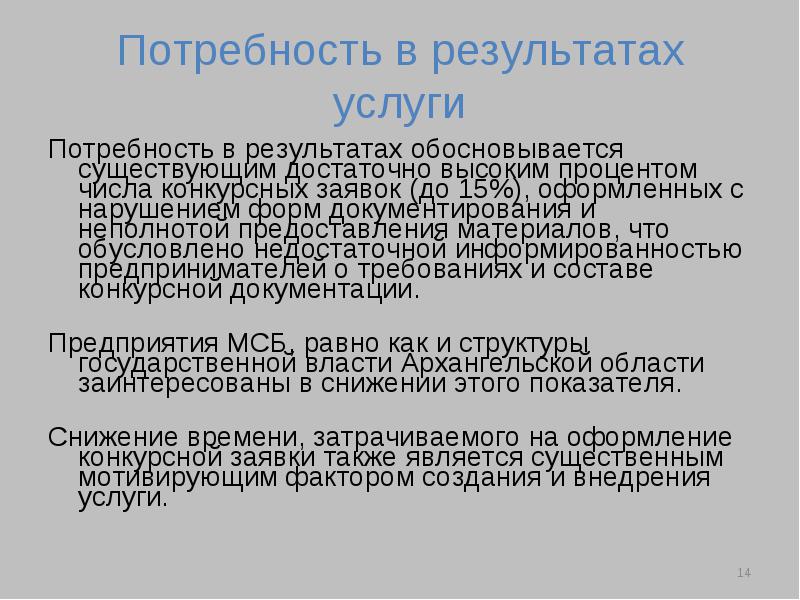
The distance learning service for specialists of small and medium-sized businesses on working on electronic trading platforms is provided by the following divisions of the Administration of the Arkhangelsk Region:
The preparation of procedures and requirements related to public procurement, as well as control over the formation, editing and updating of materials posted on the ETP, is carried out by the Regional Order Department of the Department of Economic Development of the Administration of the Arkhangelsk Region
The issuance of permission for their official publication of educational materials is carried out by the Commission for Information Support of the Official Internet Server of the Administration of the Arkhangelsk Region
The formation of information resources containing information on educational materials for publication on the official server of the Administration of the Arkhangelsk Region is carried out by the Department of Information and Public Relations of the Administration of the Arkhangelsk Region
Technical support for the software and hardware of the Internet server of the Administration of the Arkhangelsk Region is provided by the Information Technology Department
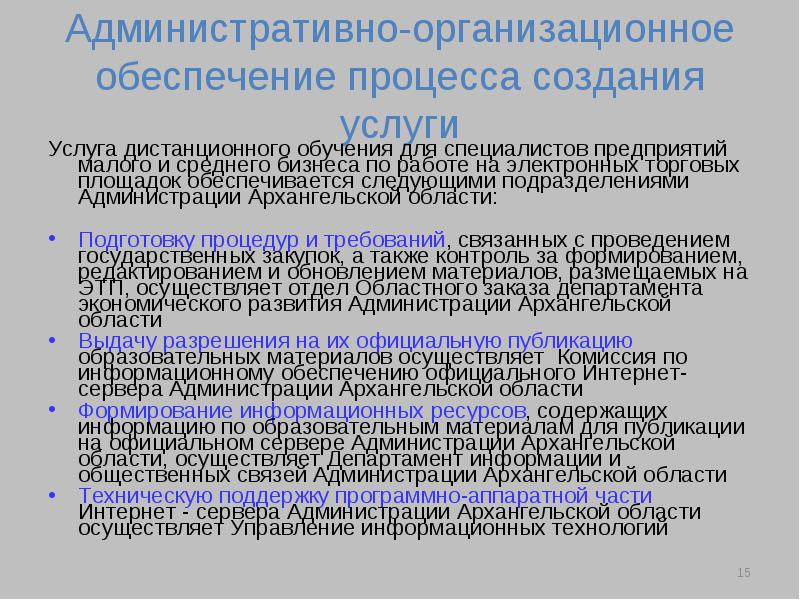
Financing of costs associated with providing infrastructure for the provision of state distance learning services for specialists of small and medium-sized businesses to work on electronic trading platforms of the Administration of the Arkhangelsk Region is provided
section 3 “Information and consulting support for small businesses” of the Socio-economic target program of the Arkhangelsk region “Development of small businesses for 2006 – 2008”,
adopted by Resolution of the Arkhangelsk Regional Council of Deputies No. 310 dated September 20, 2005, and approved by Regional Law No. 81-5 OZ dated September 20, 2005
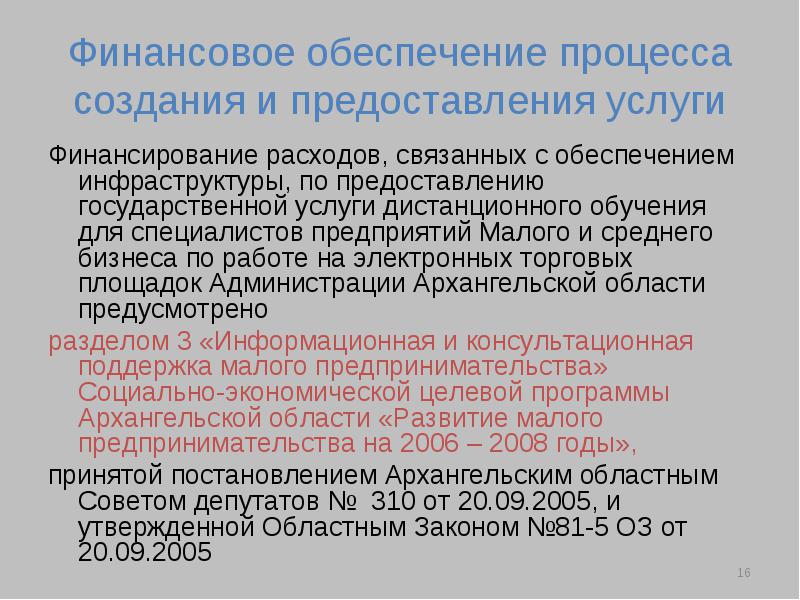
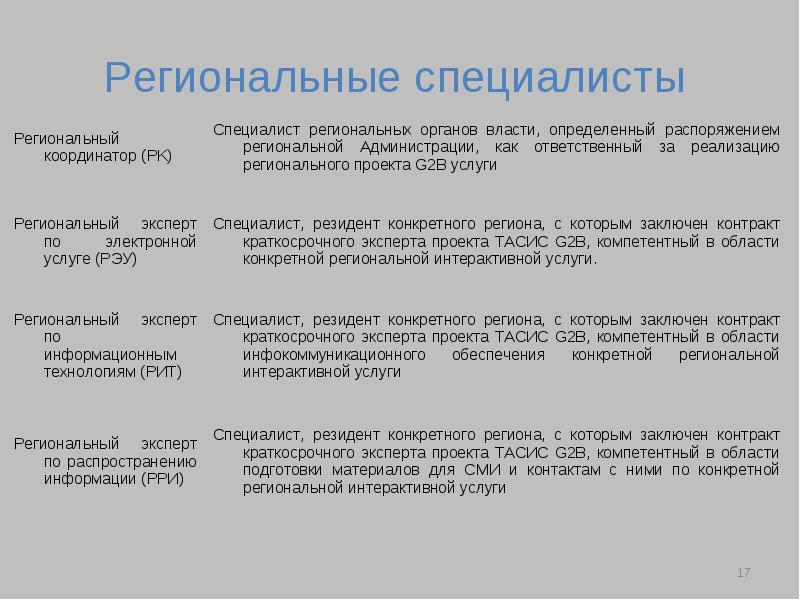
Duration (months) 3
Duration (months) 3
Contribution of the region Organizational and administrative support / Provision of trained regional specialists
Project contribution Introductory seminar on G2B services for heads of relevant authorities in St. Petersburg. Seminar for designers in the region Providing advisory services in developing concepts and specifications of services
Result Technical specifications for the G2B service project. Formed project team for pilot G2B services in the region
Registration of results A set of technical documentation, prepared in accordance with the requirements of the standards, approved by the regional government / Report on the placement of specifications on the project website
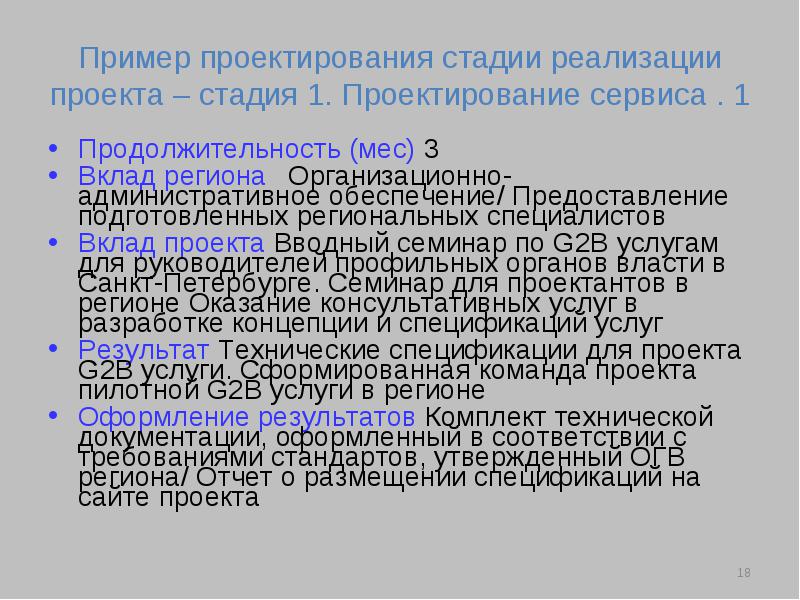
Added: 11/30/2015
Using the Internet to resolve life situations for which we contact state and municipal institutions and organizations (district and city administrations, social security authorities, Social Insurance Fund, registry offices, clinics, etc.) is natural for any modern person.
The government services website http://www.gosuslugi.ru/ appeared in 2009. Today the number of users of the resource is over 15 million people.
List of services and capabilities Single portal government and municipal services(EPGU) is constantly expanding.
Why do we need “electronic government services”?
Firstly, to receive a document that is still paper with a blue seal and signature.
Secondly, the government services portal provides citizens with convenient and easy access to information on how to quickly and conveniently obtain certain services from executive authorities and local governments.
Thirdly, the costs of maintaining government officials are being reduced. The provision of government and other services to the population becomes more transparent, open and understandable to all interested parties. The likelihood of errors caused by the so-called human factor is reduced.
Fourthly, the need to stand in queues and take time off from work is eliminated, and the reduction in the number of “personal contacts” also leads to a decrease in the level of corruption, since the opportunity to hint to the visitor about the need to “thank you for the service” disappears.
For all ordered services, you can track the status of their provision. So there is no longer any need to go to offices and call help desks - just log into your personal account on the portal. The list of services provided through the portal is constantly expanding. This is very convenient, since there is no need to contact various departments to obtain payment documents, with which you then need to go to the bank for payment.
In accordance with the Federal Law of July 27, 2010. No. 210-FZ “On the organization of provision of state and municipal services” territorial bodies Social Insurance Fund Russian Federation in some areas of activity they provide public services within the framework of approved Administrative Regulations. The list of government services that can be obtained through the Unified Portal of State and Municipal Services is posted on the website of the Social Insurance Fund of the Russian Federation www. fss. ru
Branch No. 10 of the State Institution of the Sverdlovsk Regional Branch of the Social Insurance Fund informs that to receive one or another government service you do not need to come to the branch or send documents by mail. The service can be obtained through the Unified Portal of state and municipal services ( www.gosuslugi.ru)from work or home computer, through the Multifunctional Center for the Provision of State and Municipal Services (MFC).
The list of government services that the policyholder can receive through the EPGU is posted on the website of the Social Insurance Fund of the Russian Federation www. fss. ru
How to get a government service in in electronic format?
For individuals
Registration on the portal is required www.gosuslugi.rufrom your work or home computer.
1.Go to the Portal of state and municipal services “Public Services” at http://www.gosuslugi.ru and click the “REGISTRATION” button
2. Fill in all fields and click the “Register” button.
3.To confirm the accuracy of your data, enter the confirmation code in the “Code” field, which will be sent to your mobile phone via SMS message, and click the “Continue” button.
4.Enter the password, confirm it and click the “Done” button.
5.Fill in your personal information and click the “Continue” button.
6. Automatic verification of personal data begins.
An automatic data verification is performed, usually it takes a few minutes, but in some cases the verification can take up to 5 days. If you don’t have time to wait, you can close the page - the verification will continue. The user is notified of the completion of the verification via an SMS message sent to his phone number. The test results can also be viewed in your account.
To activate your account, you must contact any Multifunctional Center(MFC) to receive an activation code.
How to receive a public service electronically through a multifunctional center (MFC) .
To receive a public service through the Unified Public Services Portal (UPSP), an individual with a passport should contact the MFI with an application to provide an access code to the UPSU or receive a universal electronic card. Providing an access code is more affordable in terms of time (from 3 days) and functional use (no additional technical devices other than a PC are required). It takes one month to receive a universal electronic card, and additional information is required to use it. technical device. Today, the access code and universal electronic card can be obtained ONLY at the MFC.
Each branch of the MFC has a separate PC through which an applicant who has an access code to the EPGU can access the Portal and apply for a public service. MFC administrators provide direct assistance in accessing the EPGU and completing the application.
The address of residence (district of the region, district of the city) does not matter when contacting the MFC. The waiting time in line does not exceed 15 minutes. MFC provides services for free, in mode "one window". Provides scanning services within the scope of documents required for the provision of public services. The list of required documents for each public service is posted on the MFC website www. mfc66. ru
Advantages of applying for government services through the MFC:
Convenient operating mode;
Pre-registration by phone is valid;
Provides free legal assistance to privileged categories of citizens in the form of consultations and training necessary documents to receive government services.
Information about the operating branches of the State Budgetary Institution SO "Multifunctional Center"
1. For residents of the Kirovsky district of Yekaterinburg: st. K. Liebknechta, 2,
tel.359-88-70; Opening hours: Monday - Sunday from 8.00 to 20.00.
2. For residents of the Berezovsky urban district: Berezovsky,
st. Heroev Truda, 23, tel. (code 34369) 3-13-45; Opening hours: Monday - Wednesday, Friday, Saturday from 9.00 to 18.00, Thursday from 9.00 to 20.00
How to receive government services electronically for Legal entities?
For legal entities:
An enhanced qualified electronic signature, which employers purchase at the Certification Center for filing tax reports, can also be used for registration on the Unified Portal of Public Services.
The head of the organization just needs to register on the service as individual. Important: The electronic signature must be issued specifically to the manager. A deputy manager or other representative of the company, who may also have electronic signatures, will not be able to register, because the data on the portal is verified with an extract from the Unified State Register of Legal Entities.
The situation is similar with branches of organizations and so-called separate divisions. They do not have the opportunity to enter the Unified Portal with their electronic signature. Only the management organization can perform any actions, for example, sign applications and reports with its electronic signature and send them to the Social Insurance Fund, including on behalf of its divisions. It's connected with information security and fraud prevention.
1. After registering the manager as an individual, it is necessary to personal account change information about the organization (the tab opens when you click on the “Go to edit” button in your Personal Account).
2. Go to the “Organizations” tab.
3. The system reminds you of the need to connect an electronic signature tool.
4. To work correctly with electronic signature tools, the system offers to download and install a plug-in program for recognizing electronic digital signatures.5. After successful installation of the plugin (program downloaded from the EPGU website), the electronic signature certificate will be detected by the system and installed.
If you encounter any difficulties during registration, you can call toll free phone to the support service of the Unified portal of state and municipal services 88001007010 .
The unified portal of public services is a modern, useful, convenient and practical service, with the help of which employers and ordinary citizens can quickly solve a huge number of problems, saving time, and in some cases even money.
When turning to e-government services, however, it is necessary to understand that it does not replace the current “personal” one and does not complement it, but only improves the process of interaction between existing government bodies and the population and business, regardless of their form of ownership.
Electronic government also helps to improve the information culture and literacy of the population, strengthening the influence of citizens on government processes, which ultimately contributes to the democratization of society.
Submit documents to a university, find out the train schedule and even make an appointment with a doctor - all this can be done without leaving your own home. The 21st century has become the era of electronic services, which in many ways make the life of a modern person easier. What can we get today by using this service?
Electronic services
What are e-services? These are services that you can use if you have a computer, mobile phone, tablet, that is, equipment with which you can connect to the Internet. Electronic services are, by and large, not new. For a long time now, we have been using the Internet to find out train and plane schedules, reserve seats, and pay for tickets using plastic cards. Currently, electronic services have been further developed, and they can already be municipal and state.
Government electronic services
Currently, electronic government services allow citizens to:
Submit an application for registration of a person at the place of residence;
Submit an application to receive address and reference information;
Submit an application for a Russian or foreign passport;
Apply for a temporary residence permit;
Issue an invitation for the entry of foreign citizens into the territory of the Russian Federation;
Apply for a residence permit;
Register for migration at your place of residence or remove it;
Obtain a license to carry out labor activities;
Apply for benefits;
Submit a tax return;
File a statement of violation;
Get an extract from the archive, etc.
Government services are provided electronically through the unified state portal of public services. All information submitted electronically is sent to employees of the relevant authorities for further processing.
To access the state portal that provides electronic services, a citizen must register on it. This needs to be done only once, and in the future you will simply need to contact the portal, if necessary, for any questions (including for using municipal services).
Municipal services
After, so to speak, testing the system for providing electronic government services, software was developed and networks of electronic interaction between authorities and municipal level organizations were created. It has become possible to provide municipal services electronically.
Municipal services in electronic form are now provided in the following areas:
Improvement and landscaping of territories;
Housing issues;
Issues of housing and communal services;
Archives;
Healthcare;
Education;
Culture and art;
Land and property relations;
Architecture and construction;
Entrepreneurial activity;
Separate services of the Civil Registry Office.
The principle of providing municipal electronic services is similar to the provision of government services. It's convenient and fast. Let's give examples.
Registration at a hospital or clinic
Of course, to be completely sure, before going to the hospital, electronic recording, you should call there to find out whether the doctor you need is seeing you: whether he has gone on vacation, or whether the appointment has been rescheduled for some purely human reasons.
Sign up for a vehicle inspection
Car owners can now sign up for a vehicle inspection via the Internet.
Sign up for kindergarten IR
Enrolling a child in kindergarten via the Internet is several times easier than resolving this issue online. on a personal basis. Now this can be done online and in advance. If there are no places in kindergarten, parents can submit an application via the Internet to one of the district resource centers. After this, go to normal or email they will receive confirmation of registration of the fact that the child is on the waiting list for kindergarten. You can find out about the progress of the queue and the date your child receives a place in kindergarten with the help of the information support service. Notifications will be sent by email, and if parents are unable to use this service, information about the progress of the queue will be provided by telephone or by regular letter.
Electronic services and their prospects
Of course, electronic services can qualitatively improve the provision of various services. While at the computer, anyone can order an extract from the archive, sign up for a technical inspection, apply for registration of real estate, submit a tax return, submit a request to the registry office for receipt re-certification about birth, about conclusion or dissolution of marriage, death, facts of adoption, adoption, establishment of paternity, change of name.
Moreover, when providing electronic services, information about the applicant is saved automatically, and a person does not have to constantly fill out the same forms or questionnaires.
As for the future of electronic services, the authorities plan to introduce a so-called electronic social card with the owner’s data, which, again, will simplify the registration process in Internet systems when providing state or municipal services.
In addition, as practice has shown, the provision of electronic services leads to faster processing of applications than those documents that were submitted to “real” structures. And one more important advantage of electronic services: they eliminate the emotional and psychological factor. And, despite the fact that the provision of electronic services is considered a relatively new direction, we can already say with confidence that such online services make life much easier for both officials and citizens themselves!
